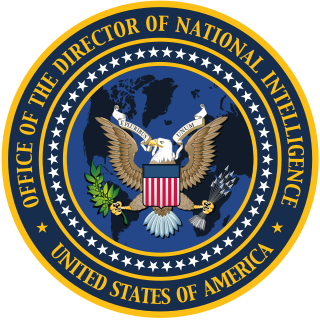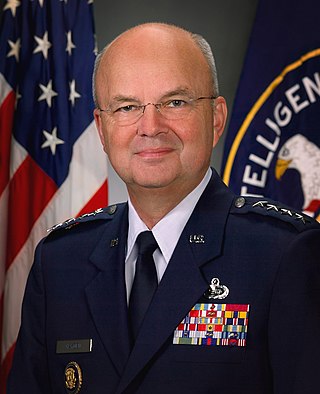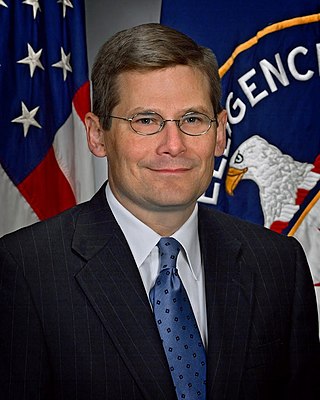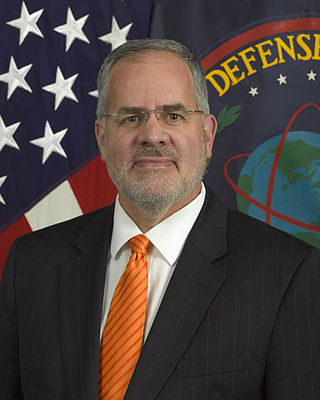
The United States National Security Council (NSC) is the principal forum used by the president of the United States for consideration of national security, military, and foreign policy matters. Based in the White House, it is part of the Executive Office of the President of the United States, and composed of senior national security advisors and Cabinet officials.

The Director of National Intelligence (DNI) is a senior cabinet-level United States government official, required by the Intelligence Reform and Terrorism Prevention Act of 2004 to serve as executive head of the United States Intelligence Community (IC) and to direct and oversee the National Intelligence Program (NIP). All IC agencies report directly to the DNI. The DNI also serves, upon invitation, as an advisor to the president of the United States, the National Security Council and the Homeland Security Council on all intelligence matters. The DNI, supported by the Office of the Director of National Intelligence (ODNI), produces the President's Daily Brief (PDB), a classified document including intelligence from all IC agencies, handed each morning to the president of the United States.

The United States Intelligence Community (IC) is a group of separate United States government intelligence agencies and subordinate organizations that work both separately and collectively to conduct intelligence activities which support the foreign policy and national security interests of the United States. Member organizations of the IC include intelligence agencies, military intelligence, and civilian intelligence and analysis offices within federal executive departments.

The President's Daily Brief, sometimes referred to as the President's Daily Briefing or the President's Daily Bulletin, is a top-secret document produced and given each morning to the president of the United States; it is also distributed to a small number of top-level US officials who are approved by the president. It includes highly classified intelligence analysis, information about covert operations, and reports from the most sensitive US sources or those shared by allied intelligence agencies. At the discretion of the president, the PDB may also be provided to the president-elect of the United States, between election day and inauguration, and to former presidents on request.

The Director of the Central Intelligence Agency (D/CIA) is a statutory office that functions as the head of the Central Intelligence Agency, which in turn is a part of the United States Intelligence Community.

Gregory L. Schulte was the U.S. ambassador to the International Atomic Energy Agency from July 2005 through June 2009. Schulte served as the Permanent Representative of the United States to the United Nations Office at Vienna, the International Atomic Energy Agency, and other international organizations in Vienna. Assuming his post on July 13, 2005, Schulte was charged with advancing the President's agenda in countering proliferation, terrorism, organized crime, and corruption, while promoting the peaceful use of nuclear energy.

The Directorate of Operations (DO), less formally called the Clandestine Service, is a component of the US Central Intelligence Agency. It was known as the Directorate of Plans from 1951 to 1973; as the Directorate of Operations from 1973 to 2005; and as the National Clandestine Service (NCS) from 2005 to 2015.

Frederick H. Fleitz, Jr. is a former U.S. government official, serving since January 2022 as Vice Chairman of the America First Policy Institute Center for American Security. He previously served as the Chief of Staff and Executive Secretary of the National Security Council from May through October 2018, during the administration of U.S. President Donald Trump. Fleitz is a former CIA analyst, and news commentator.

John Bellinger Bellinger III is an American lawyer who served as the Legal Adviser for the U.S. Department of State and the National Security Council during the George W. Bush administration. He is now a partner at the Washington, D.C. law firm Arnold & Porter, and Adjunct Senior Fellow at the Council on Foreign Relations.

Michael Vincent Hayden is a retired United States Air Force four-star general and former Director of the National Security Agency, Principal Deputy Director of National Intelligence, and Director of the Central Intelligence Agency. He also serves as a professor at the George Mason University – Schar School of Policy and Government. Hayden currently co-chairs the Bipartisan Policy Center's Electric Grid Cyber Security Initiative.

Donald MacLean Kerr, Jr. served as the Principal Deputy Director of National Intelligence from 2007 to 2009. He was confirmed by the U.S. Senate on Thursday, October 4, 2007. In March 2009, he received the National Intelligence Distinguished Service Medal.

John Owen Brennan is a former American intelligence officer who served as the Director of the Central Intelligence Agency (CIA) from March 2013 to January 2017. He served as chief counterterrorism advisor to U.S. President Barack Obama, with the title Deputy National Security Advisor for Homeland Security and Counterterrorism, and Assistant to the President. Previously, he advised Obama on foreign policy and intelligence issues during the 2008 election campaign and presidential transition.

Michael Joseph Morell is an American former career intelligence analyst. He served as the deputy director of the Central Intelligence Agency from 2010 to 2013 and twice as its acting director, first in 2011 and then from 2012 to 2013. He also serves as a professor at the George Mason University - Schar School of Policy and Government.

Michael George Vickers is an American defense official who served as the Under Secretary of Defense for Intelligence (USD-I). As USD-I, Vickers, who was appointed by President Barack Obama in 2010, was the Defense Department's top civilian military intelligence official. Before becoming USD-I, Vickers served as Assistant Secretary of Defense for Special Operations and Low Intensity Conflict.

Kenneth Leonard Wainstein is an American lawyer. He served as the first Assistant Attorney General for National Security, and later as the Homeland Security Advisor to United States President George W. Bush. In 2022 under the Biden administration, he was appointed Under Secretary of Homeland Security for Intelligence and Analysis.

David R. Shedd is a retired U.S. intelligence officer whose final post was as the acting Director of the Defense Intelligence Agency. He is a former Central Intelligence Agency operative.
Elizabeth Neumann is an American former homeland security official. In the Trump administration she served from February 2017 to April 2020 as a senior advisor and Deputy Chief of Staff of the Department of Homeland Security (DHS) to DHS Secretary John Kelly and Acting DHS Secretary Elaine Duke, and as DHS Assistant Secretary for Threat Prevention and Security Policy to DHS Secretary Kirstjen Nielsen, Acting DHS Secretary Kevin McAleenan, and Acting DHS Secretary Chad Wolf. She served on the Homeland Security Council staff in the George W. Bush administration starting in 2003.

Edward Price is an American political advisor and former intelligence officer who serves as Senior Advisor to the Secretary of State and previously was the Spokesperson for the United States Department of State from 2021 to 2023. He worked at the Central Intelligence Agency (CIA) from 2006 until 2017.

Ezra Cohen, also known as Ezra Cohen-Watnick, is an American intelligence official who served as the acting under secretary of defense for intelligence during the Trump Administration. He previously served as the acting assistant secretary of defense for special operations and low-intensity conflict, national security adviser to the United States attorney general and as a former senior director for intelligence programs for the United States National Security Council (NSC).
Olivia Troye is an American national security official who worked on national security and homeland security issues at the National Counterterrorism Center, the United States Department of Energy Office of Intelligence and Counterintelligence, and the DHS Office of Intelligence and Analysis. She went on to work in the Office of the Vice President of the United States as the Homeland Security and Counterterrorism advisor to Vice President Mike Pence and also served on the White House Coronavirus Task Force as Pence's lead staffer on the Task Force. She resigned from the White House in August 2020.



















